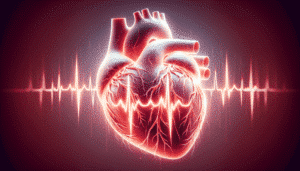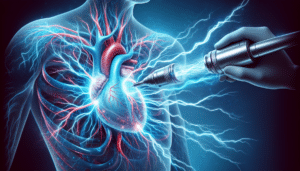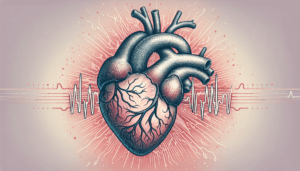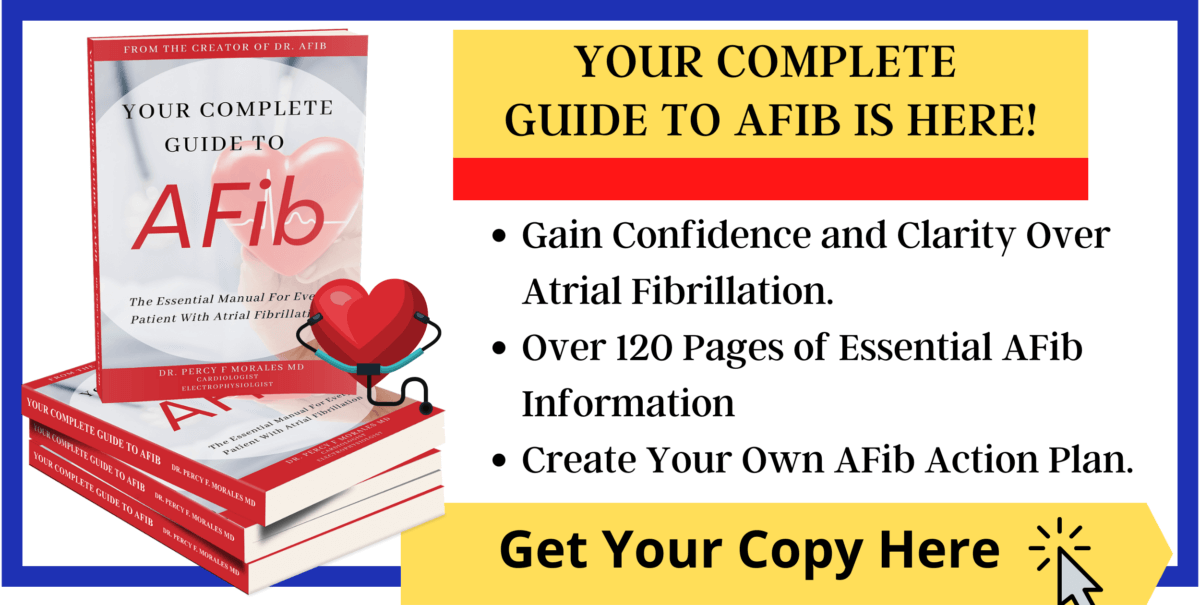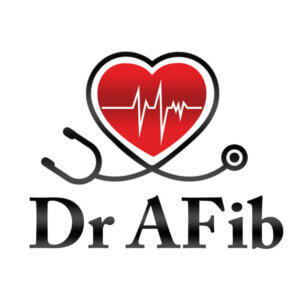Read more about AFib and shortness of breath in this article. Shortness of breath is a very common symptom that people describe when they’re having episodes of atrial fibrillation, and it’s especially common that people who are in AFib all the time feel short of breath.
How does atrial fibrillation affect breathing?
1. The Rapid Heart Rate of Atrial Fibrillation Causes Shortness of Breath
The first reason for shortness of breath is the heart rate by itself. You can imagine people who have atrial fibrillation who are not well controlled, will likely have elevated heart rates. The heart rate may be controlled when they’re just sitting down, but with just a little bit of activity the heart rate may become very fast, such as, 120, 140 bpm, sometimes even faster than that. There are patients who have, even when they’re just sitting and resting, their heart rate at 100, 110 bpm. You can imagine that if your heart rate’s going very fast consistently, it’s like as if you’re running or exercising all the time. You can imagine when you’re exercising, your heart rate gets up, and you can feel short of breath, and for patients with atrial fibrillation, they may feel this way all the time. So sometimes just the heart rate by itself can make a person feel short of breath.
2. The Loss of Normal Atrial Contraction During Atrial Fibrillation Can Cause Shortness of Breath.
What about people who have a controlled heart rate? Does the AFib also affect shortness of breath when someone has a controlled heart rate as well? What are the ways that that could happen? One example is due to the atrial fibrillation by itself, and the loss of normal atrial contraction. In atrial fibrillation, the upper chambers of your heart, or atria, is just quivering, it’s not really squeezing properly the way the upper chambers of the heart normally should. So your heart loses some of that efficiency and that certainly can contribute to some shortness of breath. The ‘atrial kick’, which is the normal contraction of the atrium, can improve cardiac output (the amount of blood your heart squeezes per minute) by around 20-30%. You can understand that the loss of normal atrial contraction during atrial fibrillation makes a significant affect on your heart function and efficiency, when can then lead to shortness of breath.
3. Elevated Pressures Inside of a Person’s Heart and/or Lungs During Atrial Fibrillation Causes Shortness of Breath and can lead to fluid retention, this is also called Congestive Heart Failure or CHF.
Also, when people are in atrial fibrillation consistently, very commonly the pressures inside of their heart can be elevated compared to someone who is not in atrial fibrillation. This can be partly caused to the lack of normal atrial contraction as discussed above. Those elevated pressures then get transmitted to the next nearest organ, which are the lungs. That’s when people start getting fluid in their lungs, this is a condition typically called congestive heart failure. So that extra pressure when patients are having atrial fibrillation can then transmit to your lungs, leading to excess fluid in your lungs and then cause shortness of breath.
Determining whether someone has elevated pressures inside of their heart can be best diagnosed with an Echocardiogram. An echocardiogram can evaluate the overall function of the heart, as well as the pressures inside the heart.
What Treatment Can Improve Shortness of Breath Due to Atrial Fibrillation?
If you are consistently in atrial fibrillation and it is causing shortness of breath, what are the ways in which it can be managed? Probably the most straightforward treatment is to get out of atrial fibrillation. There are many ways to get out of atrial fibrillation, either with medications, or with procedures, such as a cardioversion, which is an electrical shock to your heart to get out of atrial fibrillation. Another procedure option is a catheter ablation procedure, where your doctor goes through your groin to try to make strategic burn or freeze marks in your atria to try and get a person out of atrial fibrillation.
Unfortunately, not everybody is a candidate to have these types of procedures done. Not everybody is able to get out of atrial fibrillation and in some people who attempt these types of procedures; they end up back in atrial fibrillation. So what about people who don’t really have an option to get out of atrial fibrillation, are there ways to help control their shortness of breath?
The first option would be to control the heart rate with a rate controlling medication such as a beta-blocker. The second option would be to control the pressures inside of the heart and that usually involves a diuretic medication, for example, fluid medications such as Lasix or other types of diuretics which could certainly help with the shortness of breath and elevated pressures.
Those are several ways in which atrial fibrillation can affect shortness of breath as well as treatment strategies in order to help try to improve someone who is experiencing shortness of breath. Hopefully these tips can help you better understand why patients with atrial fibrillation feel short of breath and to better understand treatment options. But always discuss with your doctor which treatment options may be right for you.
The Best Atrial Fibrillation Book
Your Complete Guide To AFib: The Essential Manual For Every Patient With Atrial Fibrillation

Shop AFib Products on Amazon
KardiaMobile 6-Lead Personal EKG Monitor – Six Views of The Heart – Detects AFib and Irregular Arrhythmias – Instant Results in 30 Seconds – Works with Most Smartphones - FSA/HSA Eligible
13% Off
KardiaMobile 1-Lead Personal EKG Monitor – Record EKGs at Home – Detects AFib and Irregular Arrhythmias – Instant Results in 30 Seconds – Easy to Use – Works with Most Smartphones - FSA/HSA Eligible
$79.00 (as of June 15, 2025 15:13 GMT -06:00 - More infoProduct prices and availability are accurate as of the date/time indicated and are subject to change. Any price and availability information displayed on [relevant Amazon Site(s), as applicable] at the time of purchase will apply to the purchase of this product.)
Apple Watch Series 9 [GPS 41mm] Smartwatch with Storm Blue Aluminum Case with Silver Sport Band M/L. Fitness Tracker, Blood Oxygen & ECG Apps, Always-On Retina Display
(as of June 15, 2025 08:34 GMT -06:00 - More infoProduct prices and availability are accurate as of the date/time indicated and are subject to change. Any price and availability information displayed on [relevant Amazon Site(s), as applicable] at the time of purchase will apply to the purchase of this product.)
Fitbit Sense 2 Advanced Health and Fitness Smartwatch with Tools to Manage Stress and Sleep, ECG App, SpO2, 24/7 Heart Rate and GPS, Shadow Grey/Graphite, One Size (S & L Bands Included)
20% Off
OMRON 2-in-1 Upper Arm Blood Pressure Monitor & 1-Lead EKG Monitor - Clinically Validated Blood Pressure Arm Cuff & Machine - Use OMRON Connect App
24% Off
Samsung Galaxy Watch 6 44mm Bluetooth Smartwatch, Fitness Tracker, Personalized HR Zones, Advanced Sleep Coaching, Heart Monitor, BIA Sensor, Health Wellness Insights, Big Screen, US Version, Graphite
$353.21 (as of June 15, 2025 20:21 GMT -06:00 - More infoProduct prices and availability are accurate as of the date/time indicated and are subject to change. Any price and availability information displayed on [relevant Amazon Site(s), as applicable] at the time of purchase will apply to the purchase of this product.)
Natural Rhythm Triple Calm Magnesium 150 mg - 120 Capsules – Magnesium Complex Compound Supplement with Magnesium Glycinate, Malate, and Taurate. Calming Blend for Promoting Rest and Relaxation.
$20.77 ($0.17 / Count) (as of June 15, 2025 17:47 GMT -06:00 - More infoProduct prices and availability are accurate as of the date/time indicated and are subject to change. Any price and availability information displayed on [relevant Amazon Site(s), as applicable] at the time of purchase will apply to the purchase of this product.)
Pure Encapsulations Magnesium (Glycinate) - Supplement to Support Stress Relief, Sleep, Heart Health, Nerves, Muscles, and Metabolism* - with Magnesium Glycinate - 180 Capsules
$44.60 ($0.25 / Count) (as of June 15, 2025 08:34 GMT -06:00 - More infoProduct prices and availability are accurate as of the date/time indicated and are subject to change. Any price and availability information displayed on [relevant Amazon Site(s), as applicable] at the time of purchase will apply to the purchase of this product.)
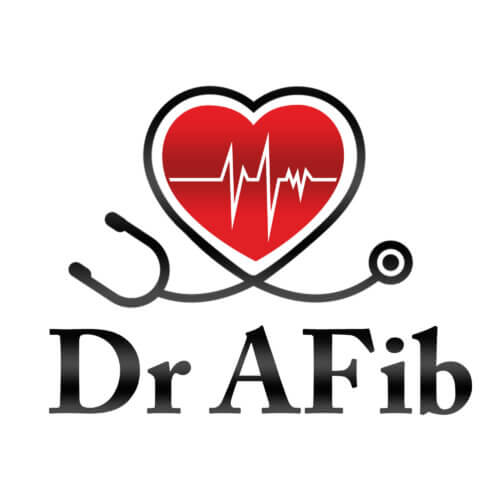














![Apple Watch Series 9 [GPS 41mm] Smartwatch with Storm Blue Aluminum Case with Silver Sport Band M/L. Fitness Tracker, Blood Oxygen & ECG Apps, Always-On Retina Display #1](https://m.media-amazon.com/images/I/311xwtp4mFL._SL100_.jpg)
![Apple Watch Series 9 [GPS 41mm] Smartwatch with Storm Blue Aluminum Case with Silver Sport Band M/L. Fitness Tracker, Blood Oxygen & ECG Apps, Always-On Retina Display #2](https://m.media-amazon.com/images/I/41j+8AaUGsL._SL100_.jpg)
![Apple Watch Series 9 [GPS 41mm] Smartwatch with Storm Blue Aluminum Case with Silver Sport Band M/L. Fitness Tracker, Blood Oxygen & ECG Apps, Always-On Retina Display #3](https://m.media-amazon.com/images/I/41jIyxZitnL._SL100_.jpg)
![Apple Watch Series 9 [GPS 41mm] Smartwatch with Storm Blue Aluminum Case with Silver Sport Band M/L. Fitness Tracker, Blood Oxygen & ECG Apps, Always-On Retina Display #4](https://m.media-amazon.com/images/I/41IpNJERjCL._SL100_.jpg)
![Apple Watch Series 9 [GPS 41mm] Smartwatch with Storm Blue Aluminum Case with Silver Sport Band M/L. Fitness Tracker, Blood Oxygen & ECG Apps, Always-On Retina Display #5](https://m.media-amazon.com/images/I/31o17yhfYpL._SL100_.jpg)






























